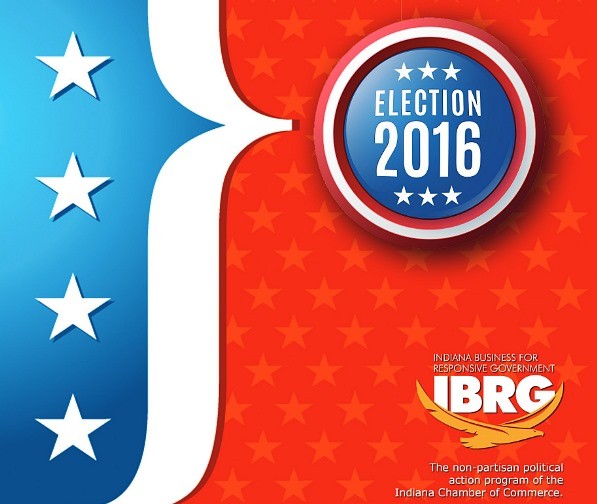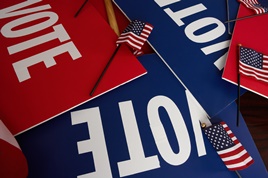 Indiana Business for Responsive Government (IBRG), the non-partisan political action program of the Indiana Chamber of Commerce, scored a very successful general election; 57 of 59 IBRG-endorsed candidates facing opposition were victorious, including Republicans and Democrats. Twenty additional endorsed candidates did not face general election challenges.
Indiana Business for Responsive Government (IBRG), the non-partisan political action program of the Indiana Chamber of Commerce, scored a very successful general election; 57 of 59 IBRG-endorsed candidates facing opposition were victorious, including Republicans and Democrats. Twenty additional endorsed candidates did not face general election challenges.
Eleven new legislators won with IBRG endorsements. IBRG was significantly engaged in support of five top-target candidates in open seat races, as well as successfully defending six pro-economy incumbents seriously challenged with defeat.
In a stunning Indiana election, Republicans swept all statewide races by significant margins, led by a 20 percentage point victory by Donald Trump. Not only wasn’t the scale of these win margins predicted in polling, but once again the final outcome defied expectations just months – even weeks – ago of a coming “market correction” in the GOP’s state legislative super-majority seat counts.
In the General Assembly, Republicans seriously exceeded expectations again in a volatile election environment. In the House, Democrats were able to pick-off just one first-term incumbent Republican legislator in Lake County (after an unprecedented multi-race battle in northwest Indiana for weeks), with the result being a 70-30 GOP majority next year.
In the Senate, Republicans actually managed to expand their majority by another seat to a 41-9 majority. They did so by defending two very competitive open seat races in Indianapolis and by picking up an open seat in LaPorte, largely by default from Democrats.
Twelve new members were elected to the House and nine new members to the Senate. One additional Senate seat will become vacant with a resignation and be filled by a local caucus later this year. This turnover in new seats rivals the huge numbers out of the 2010 and 2012 election cycles.
It seems that every national election in recent times has been labeled “historic” (among many other adjectives) before and after the votes are cast. Without question, the 2016 elections fit that label, but it’s really more than that. A fundamental realignment of the American electorate is well underway, driven by major upheavals and demographic shifts in this nation.
Read the full report. The report includes election results, statistics, and information on key races and new legislators. It will be updated periodically as final tallies and additional analyses are added.

 To describe the 2016 primary elections in Indiana as anything less than dramatic and jarring seems an understatement. Two years ago, record low turnout tipped the balance to ideological sub-groups of motivated voters. This year, unprecedented turnout in both parties was the environment.
To describe the 2016 primary elections in Indiana as anything less than dramatic and jarring seems an understatement. Two years ago, record low turnout tipped the balance to ideological sub-groups of motivated voters. This year, unprecedented turnout in both parties was the environment. Over the years, we’ve met, interviewed and evaluated hundreds of candidates for the Indiana Chamber’s non-partisan political action program,
Over the years, we’ve met, interviewed and evaluated hundreds of candidates for the Indiana Chamber’s non-partisan political action program,  A couple of months ago I had the pleasure to attend the Indiana Chamber’s statewide summit on the
A couple of months ago I had the pleasure to attend the Indiana Chamber’s statewide summit on the .jpg) An election of historic proportions has just taken place in our nation and right here in Indiana. There were some big surprises, big changes, and a lot of "status quo" outcomes. Read all the results in the Indiana Chamber/IBRG’s
An election of historic proportions has just taken place in our nation and right here in Indiana. There were some big surprises, big changes, and a lot of "status quo" outcomes. Read all the results in the Indiana Chamber/IBRG’s  The Indiana Chamber of Commerce announced today its endorsement of State Rep. Mary Ann Sullivan (D-Indianapolis) in her general election challenge to incumbent State Sen. Brent Waltz (R-Greenwood) for the Indiana Senate District 36 seat. The endorsement was made by Indiana Business for Responsive Government (IBRG), the non-partisan political program of the Indiana Chamber.
The Indiana Chamber of Commerce announced today its endorsement of State Rep. Mary Ann Sullivan (D-Indianapolis) in her general election challenge to incumbent State Sen. Brent Waltz (R-Greenwood) for the Indiana Senate District 36 seat. The endorsement was made by Indiana Business for Responsive Government (IBRG), the non-partisan political program of the Indiana Chamber.